Ensuring the Tenderloin’s departed are not forgotten
Since founding San Francisco Network Ministries more than 40 years ago, the Rev. Glenda Hope has helped thousands of the city’s most anonymous residents leave the world with grace.
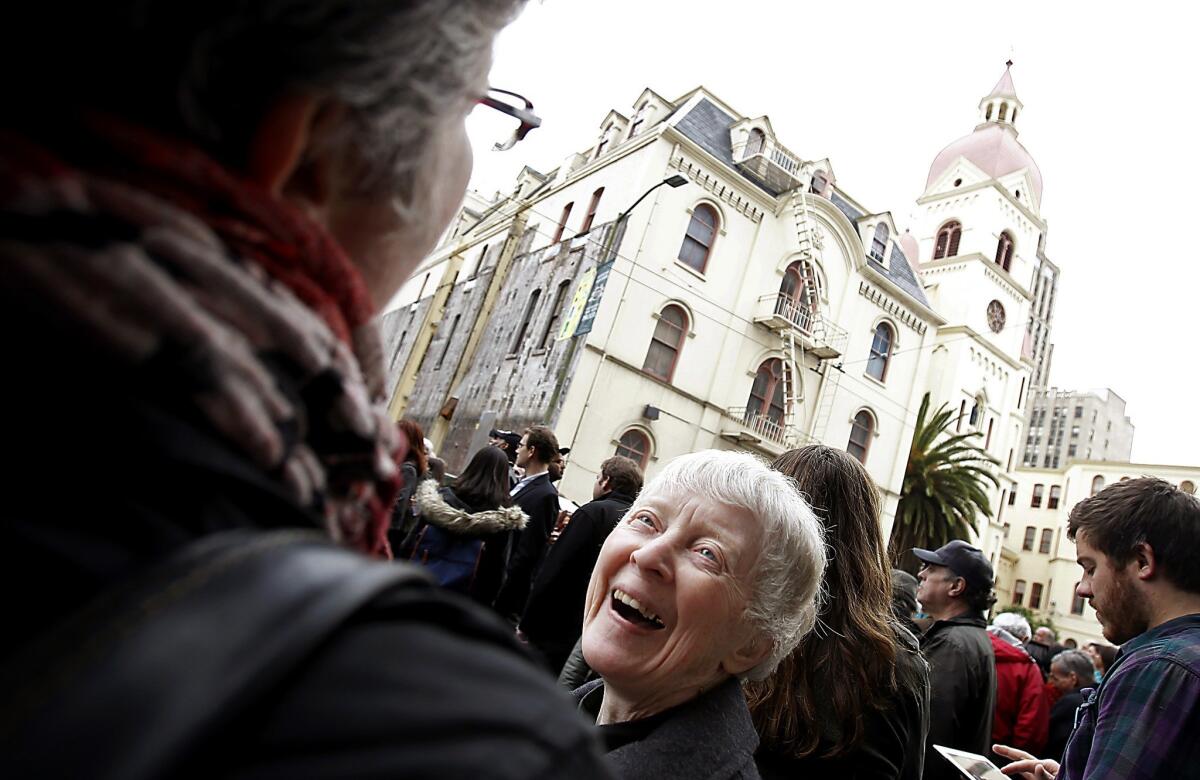
Arnold Stringfellow lived alone in a single-room-occupancy hotel in the Tenderloin. He died alone in the county hospital. He was 64.
On a chilly morning not long after, the Rev. Glenda Hope stood before a small crowd in the community room of the Camelot Hotel. On a folding table behind the Presbyterian minister was a color copier image of Stringfellow, a big plate of cake in hand, smiling.
Hope adjusted her hearing aids and issued the greeting she had spoken many times before.
"Good morning, friends," the minister began, solemn and gentle. "None of us wants to think that when we die, no notice will be taken and no respect given. So thank you for being here to take notice and give this final respect to Arnold."
Since founding San Francisco Network Ministries more than 40 years ago, Hope has helped thousands of the city's most anonymous residents leave the world with grace. She has performed memorials on the streets of the Tenderloin and in its SRO hotels. She has arranged for obituaries to be placed in a neighborhood newspaper, which dubbed her the "Tenderloin closer."
But Hope, who soon will turn 77, plans to retire from the ministry this fall, and she is looking for someone to take her place.
Someone to help the men and women of San Francisco's SROs pay last respects to neighbors and friends. Someone to let them know that they won't be forgotten when their own time comes.
"I know that we, gathered here, have had many losses, many griefs," Hope told those assembled in Stringfellow's memory. "We have mourned many times. So I invite you, if you like, to share your feelings or tell a story about Arnold."
Stringfellow's friends laughed over his nickname, "Unabomber," a nod to his love of electronics. They reminisced about his disco-era patchwork jacket, about his fondness for vending-machine cookies.
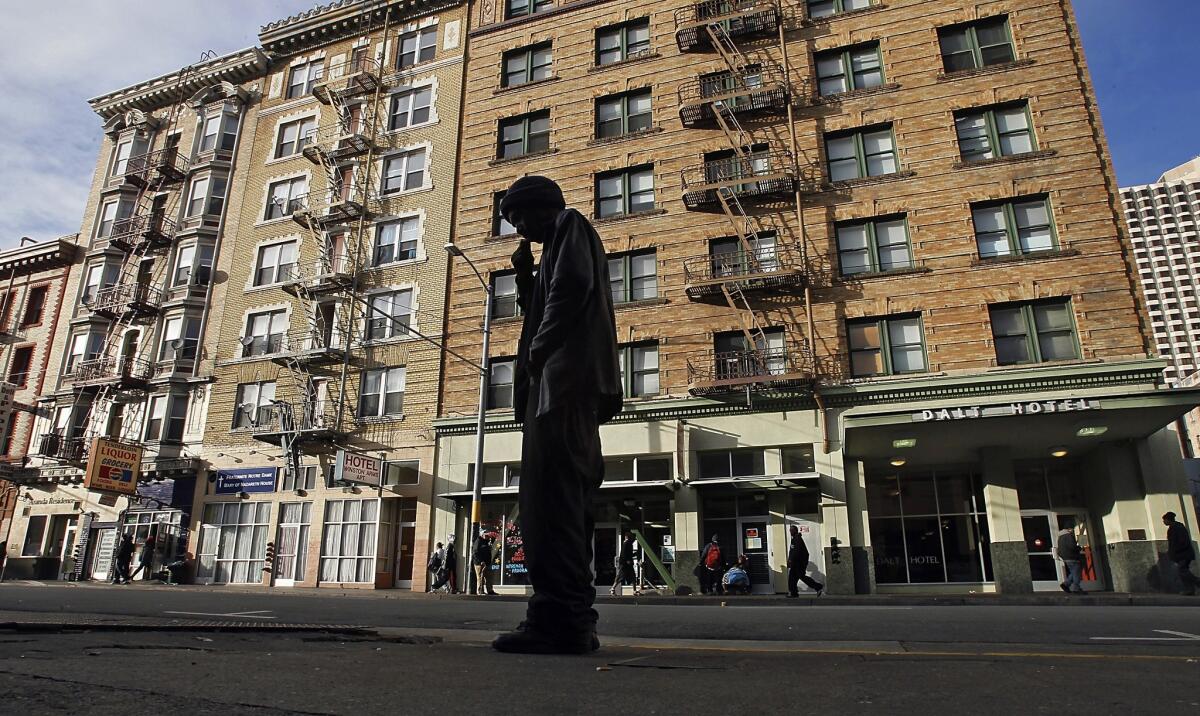
When Ruth Fitchett jumped from the window of her small room in the Dalt Hotel and died on Turk Street, five stories below, "we thought, 'We can't just let Ruth disappear,'" Glenda Hope said. "So we asked the manager if we could do a memorial service ... in the lobby of the hotel. And she said yes." More photos
And then, before the coffee was poured and the cupcakes eaten, the tears dried and Hope's final blessing given, they all agreed on one more thing.
Arnold Stringfellow had mattered.

In the late 1970s, members of the Network Ministries began visiting residents in the Tenderloin's SROs. Some had colorful stories, like the old vaudevillian with his trunk full of show-biz gear. Some had only sadness, like Ruth Fitchett, in her early 80s, diabetic and suffering from chronic depression.
Fitchett had one room in the Dalt Hotel, which she rarely left. She had one friend, a neighbor named Bob. And she had one regular visitor, Sister Clare, part of Network Ministries' pastoral care team.
When Fitchett jumped from the window of her small room and died on Turk Street, five stories below, "we thought, 'We can't just let Ruth disappear,' " Hope said. "So we asked the manager if we could do a memorial service ... in the lobby of the hotel. And she said yes."
Hope, Sister Clare and Father Dan O'Connor had no idea if anyone would show. But on that day, the residents came — men in worn, shiny suits, women in pumps and Sunday-go-to-meeting clothes.
Grief, as I often say to others, is just the price we pay for love. A more than acceptable trade-off."— Rev. Glenda Hope
Sister Clare played the guitar and sang "Amazing Grace." Hope preached. Kool-Aid was served, along with cookies from cellophane packs whose labels had fallen off a long time before.
Fitchett's memorial would be the first of thousands held in the run-down lobbies and community rooms of the Tenderloin's residential hotels and officiated by the tiny minister with the bright blue eyes and the Georgia drawl.
"Prior to that, when people in the Tenderloin died, they just disappeared," Hope said. "And the message to the survivors was, 'Nobody cares. They don't matter. You don't matter, either. And when you die, nobody would care.'
"We just couldn't let that be."

While she could single-handedly engineer a memorial service, Hope knew that giving the SRO residents the final dignity of an obituary was another thing entirely. The free ones chronicled the lives and deaths of the rich or noteworthy. The paid ones were simply too expensive.
So after a small monthly newspaper called the Central City Extra began covering the Tenderloin and the bedraggled corners of the South of Market neighborhood, Hope called the publisher with an invitation: When we have a memorial, send a reporter.
"And we thought, 'Holy cow, what an opportunity.' We were not aware of what she was doing, how much, and how important it was," publisher Geoffrey Link said. "The obituaries clearly became the most popular part of the newspaper — and still are."
The Central City Extra, which describes its readership as "the neighborhood's fixed-income and no-income populace," tries to publish at least one obituary each month. Earlier this year, a collection of the 99 best came out in glossy paperback form.
The lives portrayed in "Death in the Tenderloin: A Slice of Life from the Heart of San Francisco" are largely short and difficult. The deaths are sometimes violent and almost always lonely.
Like Byron Lee, who died at 63 of chronic kidney failure: No one knew where he grew up or who he had loved, whether he had gone to college, been in the service or fathered children.
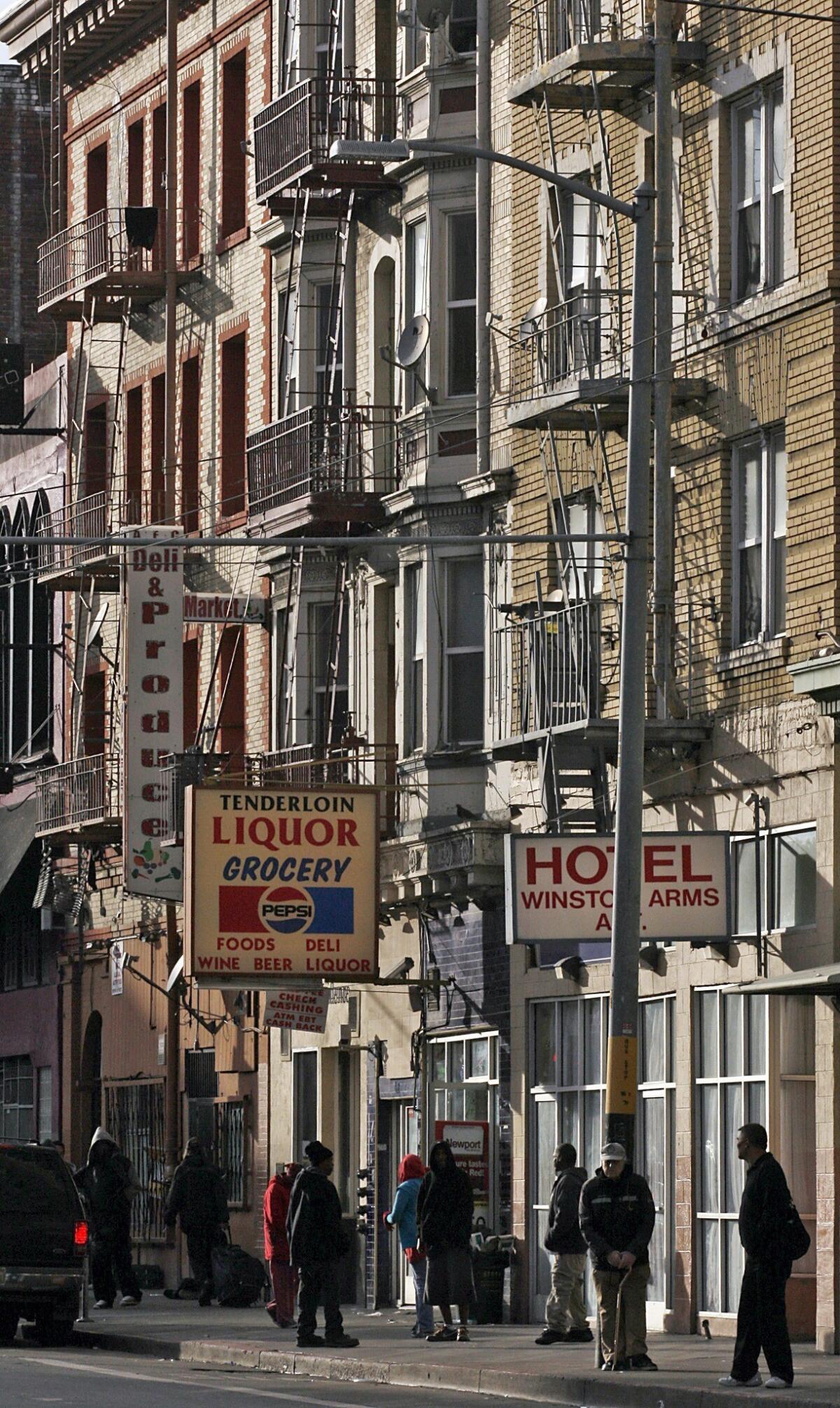
Skid row residents loiter on the sidewalks of Turk Street in the Tenderloin district of San Francisco.More photos
And Herbert Ivan Schwarz: Schwarz died in his room at the Coast Hotel, on O'Farrell Street, where he had lived for two years. A resident said his body was discovered during a routine pest control inspection; he'd been dead at least a week. Schwarz was not yet 40.
And Anthony Shelton, who lived much of his life on the streets and died at 40 of complications from AIDS. His obituary is three paragraphs. This is the longest one: Shelton had lived at the Franciscan Towers for six months in the Shelter Plus Care program. His memorial, marked by a small vase of roses and a candle on a table off the lobby, was attended only by the hotel's social worker and Rev. Glenda Hope, who offered a short prayer.
Hope is described in the book's pages as a woman whose life and work have helped create "a compassionate community" in 30 or so of the poorest, most densely populated blocks in San Francisco.
She is a widow and a vegetarian. (She says she realized when her beloved dog Podie died in 1981 that, if she couldn't eat him, she shouldn't eat any living thing.)
And for someone surrounded every day by pain and loss, she can be awfully funny. While preaching in 2011 at the Metropolitan Community Church here, she praised the largely gay and lesbian congregation for laughing a lot more than many Presbyterian communities, which "sit there looking like John Calvin."
"Just before the service, I was actually awarded a button." Pause. "Which I don't think I'm going to wear." Laughter. "It says, 'Love the heterosexual, hate their sin.' "
Sometimes, though, the pain is hard to bear. Like the day she memorialized Leo Bradshaw, an electrician turned alcoholic whose handiwork lives on in her home in the Outer Mission neighborhood. Bradshaw's brief obituary ends with the email she sent to the newspaper just hours after his service.
"I barely made it back to the office before I went to pieces," Hope wrote. "Grief, as I often say to others, is just the price we pay for love. A more than acceptable trade-off."

For years Hope has presided over an average of two or three memorials each week. Some, for the neighborhood's more gregarious residents, attract dozens of mourners. Others, like Shelton's, are attended by the minister and a single hotel employee.
Anyone can do a memorial, she said, and a clerical collar is not required. But serving the Tenderloin takes a special touch, and she has yet to find just the right person — or people — to take over when she retires.
"It needs to be people of faith, who are also involved in the neighborhood," Hope said. "It can't just be some preacher who comes in to do them."
Three hours after she left Stringfellow's service, it was time to say goodbye to Ralph Kevin Urbancic, 55, found dead of a drug overdose by a staff member at the Civic Center Residence where he had lived since 2009.
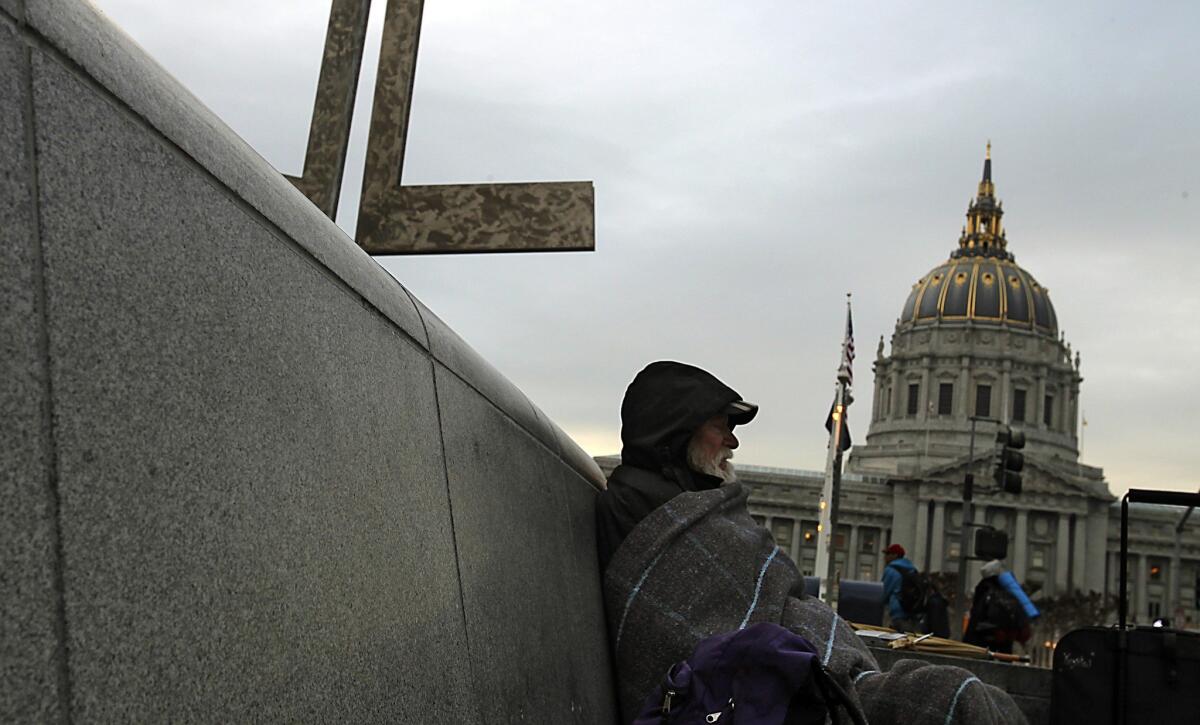
A homeless man named Ron bundles up against the chill as dusk settles on San Francisco City Hall. For years Glenda Hope has presided over an average of two or three memorials each week. Some, for the neighborhood's more gregarious residents, attract dozens of mourners. Others are attended by the minister and a single hotel employee. More photos
A handful of mourners gathered on folding chairs placed in a circle in the SRO's basement community room. A maintenance crew somewhere in the building banged away, occasionally drowning out the soft voices.
Hope talked about "the holy in each one of us" and God's love and life's regrets. She recited the 23rd Psalm: "God is my shepherd, I shall not want. He makes me lie down in green pastures. He leads me beside still waters. He restores my soul."
And then she paused.
"We don't see a lot of green pastures in the Tenderloin," she said, rueful, smiling. "And the still waters, we might not want to put our hands and feet in. But what this really means is the place of safety."
And this, she said, is a safe place to remember.
"Kevin had his own demons, and I watched him go through it," said Richard Beard, 63, wearing overalls with a Grateful Dead emblem. "I just truly hope that he's in a better place, that he knows he was cared about."
There were nods all around.
"How basic that is," Hope said. "To know we are cared about."
Follow Maria L. La Ganga (@marialaganga) on Twitter
More great reads
Councilman Bill Rosendahl's colorful life of city service
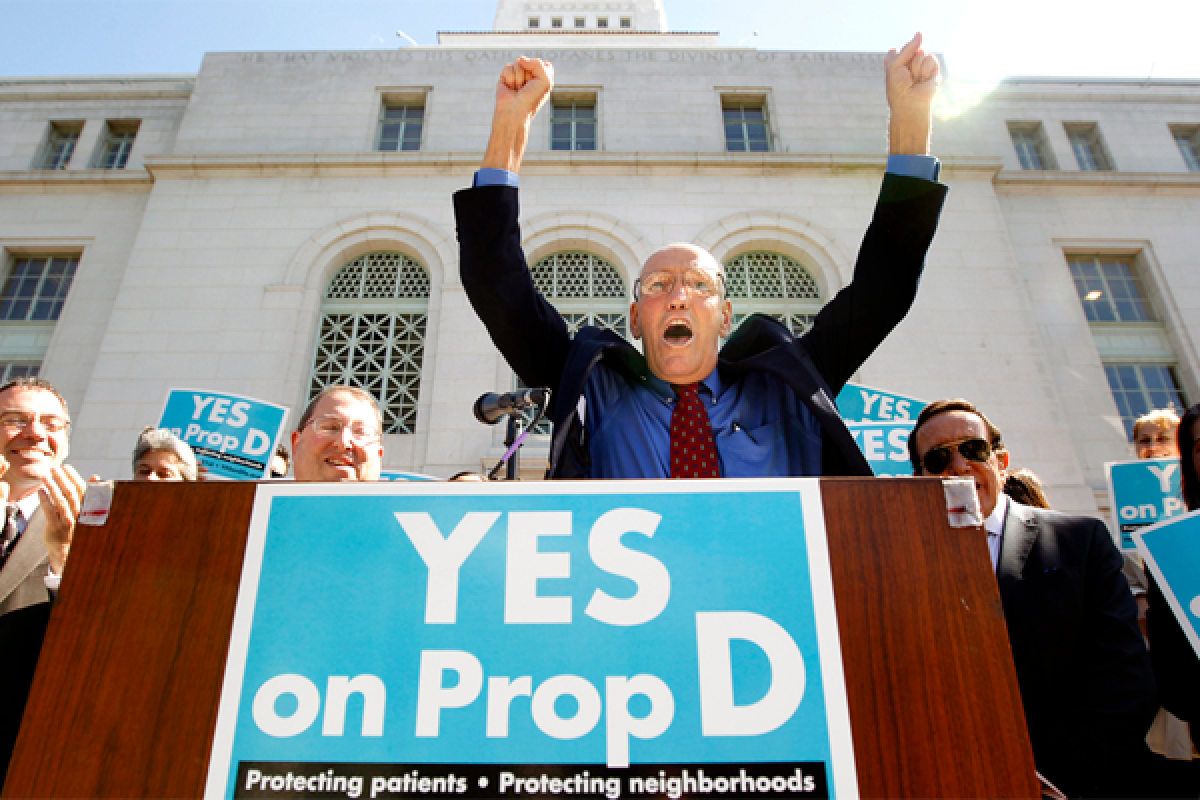
I think he feels responsible for making the world a better place."
Auction sends wild horses to sanctuary — or slaughter
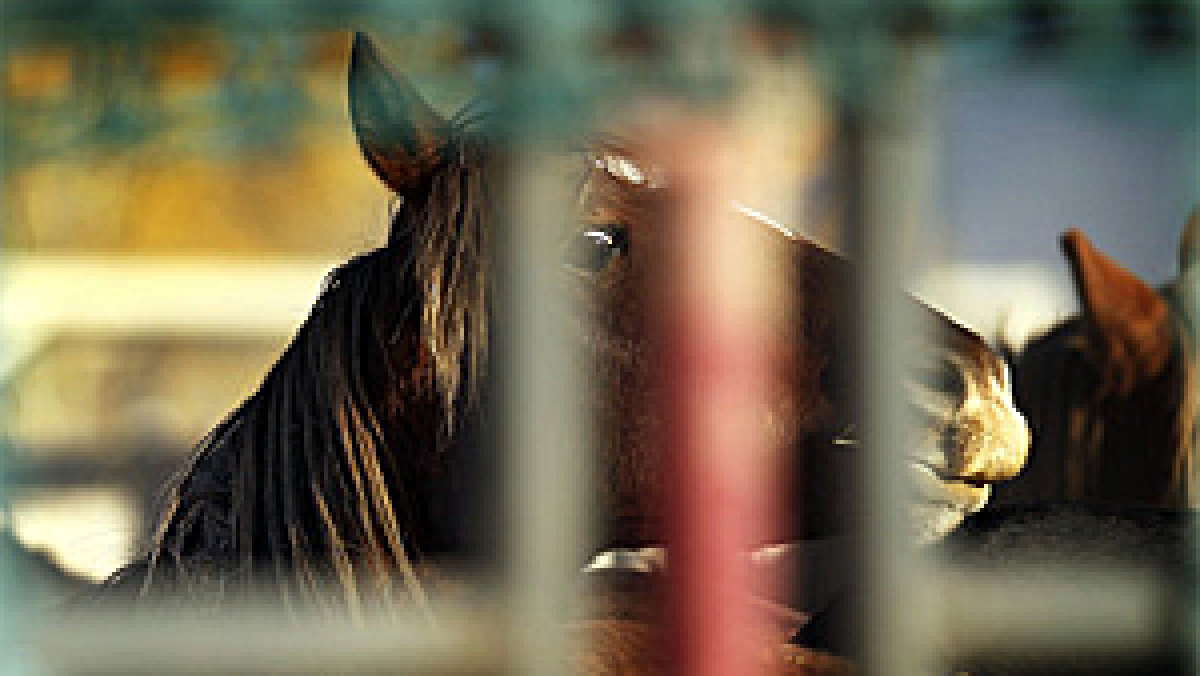
The agency removes horses, but you don't see them taking cattle off the range."
Old guard, young blood clash in Salinas' halls of power
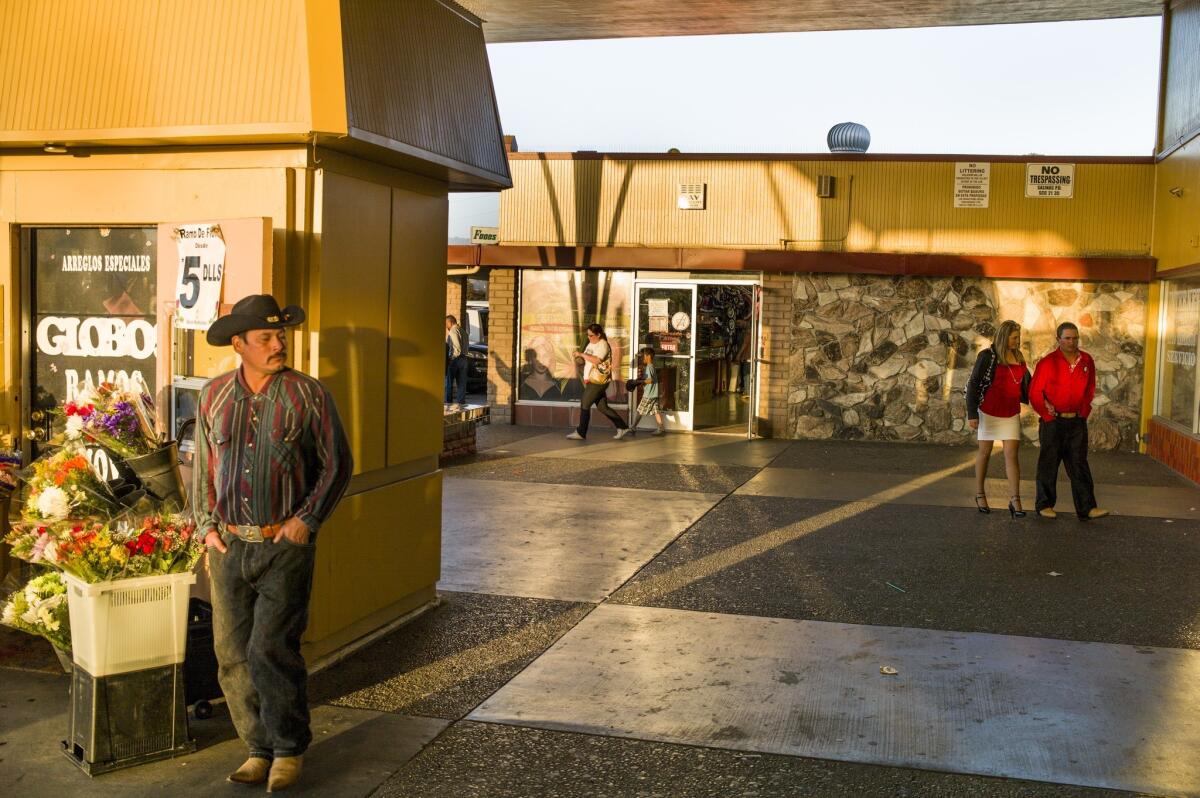
There were bad things done in Salinas in the past, and we haven't healed from that."
